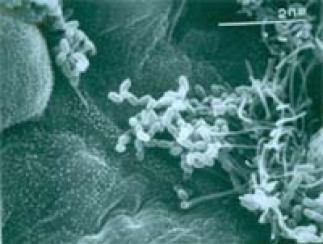Conférence du Dre Samantha Gruenheid, professeure associée, du Département de microbiologie et immunologie à l'Université McGill. Cette conférence sera prononcée en anglais.
Résumé
Our lab is focused on identifying and studying the molecules and pathways that play critical roles during the interaction of bacterial pathogens with their hosts. We examine the host/pathogen interaction from both angles: the virulence mechanisms employed by bacteria to cause disease, and the mechanisms employed by the host to resist infection. The bacterial pathogens EHEC and EPEC attach to intestinal epithelial cells and use a 'molecular syringe,' the type III secretion system to inject bacterial virulence proteins directly into host cells. NleA is a type III-translocated effector protein that is critical for virulence of EHEC, EPEC and related pathogens.
Current work in the lab is focused on investigating the molecular and physiological basis for nleA's striking effect on virulence, in order to understand its role in disease. Despite these and other sophisticated virulence mechanisms employed by bacteria to cause disease within the host, the outcome of infection can vary greatly between individuals. To further understand the varying host response to these infections, we have also been applying a genetic approach to the Citrobacter rodentium mouse infection model to identify host genes and proteins that play critical roles in susceptibility/resistance to infection with EHEC and related pathogens.
Conférence présentée par le Département de microbiologie et immunologie de l'Université de Montréal.
Crédit photo : site Web du Département de microbiologie et immunologie

